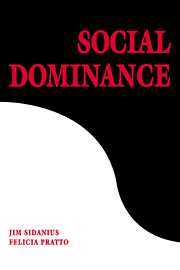Systems of group-based social hierarchy and oppression do not just fall from the sky, nor do they merely result from the accidents and vicissitudes of human history. Rather, while the proximal forces constructing and maintaining oppressive systems are complex and multifaceted, they are also the expressions of human will, agency, and mind. However, perhaps psychology's greatest insight is that the human mind both forms and is formed by human society. Therefore, understanding the nature and dynamics of group-based social inequality requires that we understand the psychology of group dominance. In this chapter we will argue that one of the ways in which this psychology of group dominance expresses itself is in a form we call social dominance orientation (SDO).
SDO is defined as a very general individual differences orientation expressing the value that people place on nonegalitarian and hierarchically structured relationships among social groups. It expresses general support for the domination of certain socially constructed groups over other socially constructed groups, regardless of the manner in which these groups are defined. These groups may be defined on the basis of race, sex, nationality, ethnicity, religion, social class, region, skin color, clan, caste, lineage, tribe, minimal groups, or any other group distinction that the human mind is capable of constructing. Individuals differ in the degree to which they desire group-based inequality and dominance for any number of reasons.
